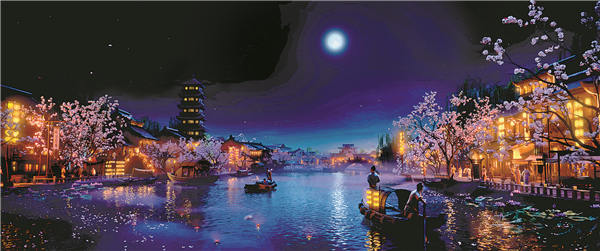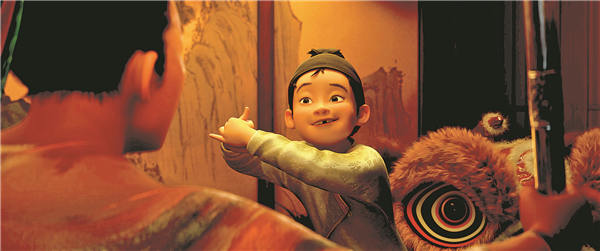

Animated movie breathes new life into Tang Dynasty's most iconic poets, Xu Fan reports.
Starting from primary school and continuing until high school, reciting masterpieces from prestigious Tang Dynasty (618-907) poets such as Li Bai and Du Fu has always been an integral part of a Chinese child's education.
So, to see a child softly reciting the familiar poems while writing the characters in the animated movie Chang'an will be a familiar experience for Chinese audiences.
Named after the ancient name for Xi'an in Shaanxi province, which served as the capital of the Tang Dynasty for over 280 years, the movie brings to life some of the most iconic figures in Chinese literary history. With a runtime of 168 minutes — the longest of any Chinese animated movie — it is suitably epic in scale.

Paths intertwine
Since its release on June 8, the movie has garnered a rating of 8.2 points out of ten on Douban, one of the country's largest review aggregators, consolidating its position as one of the highly acclaimed animated blockbusters of the summer season.
Despite Li and Du featured in a lot of movies and TV shows in past decades, the movie employs an unconventional perspective to grab viewers' attention from the start. It commences with the recollections of Gao Shi, also a renowned poet and confidant of Li, who chronicles the vicissitudes in the life of Li, who is probably the country's most beloved poet and whose name alone evokes legends.
In the movie, Li and Gao's paths intertwine when Li mistakenly identifies Gao as one of the thieves who stole his horse, unaware that Gao is leaving his rural hometown to pursue a government position in the capital city of the Tang empire. Their friendship spans decades, interweaving their personal journeys amid the dynasty's transition from peak prosperity to turmoil caused by a rebellion led by An Lushan, who was once one of Emperor Xuanzong's most trusted generals.
Aside from Li and Gao, the movie also features some of the most renowned poets and artists of the era, including Wang Changling, known for his military-themed poems, calligrapher Zhang Xu and palace musician Li Guinian, as well as then royal members who held significant influence within the literati circle, such as Princess Yuzhen.
Interweaving the personal fates of these figures, the film vividly reenacts the magnificent scenes of the Tang Dynasty. It showcases the bustling streets of ancient Chang'an, the vibrant and prosperous city of Yangzhou, as well as the harsh and snowy borderlands in Northwest China.
The movie also beautifully captures the nature of the Tang Dynasty. For instance, in the national civil service examination, the highest achievers are granted the privilege to ride magnificent horses and pluck the most exquisite flower from any residence in the capital city.
Additionally, during moments of inspiration, poets would visit local taverns where they could revel in the company of foreign dancers, enjoying their captivating dance and melodious singing, while sipping on wine and crafting verses of poetry.